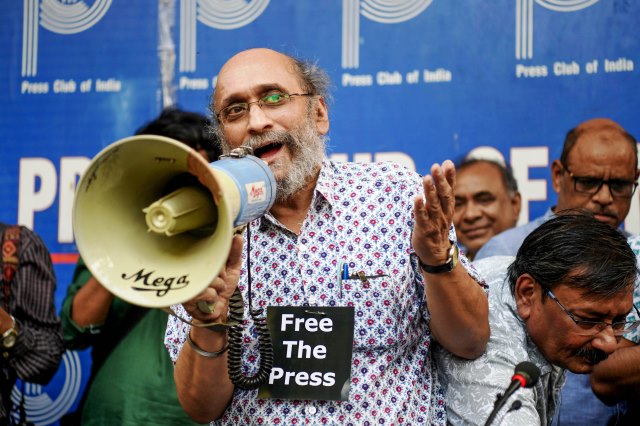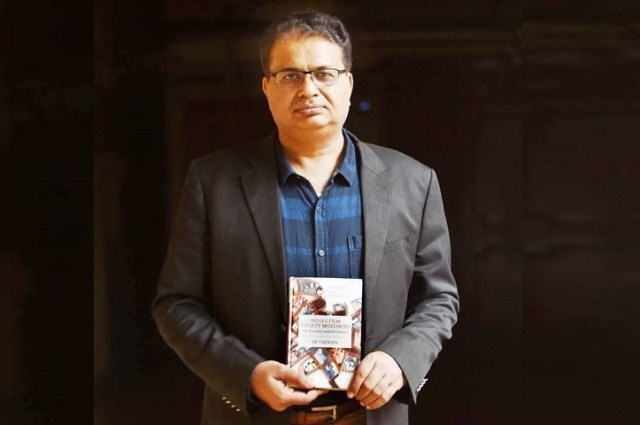The megaphones have been laid down now. The selfies and clips of journalists and others protesting in Delhi are no longer going “viral” (that unpleasant word used to describe when something spreads without much control) and the media have gone back to looking for the next big thing. As this week began, their focus, at least briefly, turned to the mass assault by Hamas, a Palestinian Sunni-Islamic fundamentalist, militant, and nationalist organisation, and the dark shadow of yet another war that could well be in the making.
Perhaps the slight sense of distance from last Tuesday’s raid by the Delhi Police against Newsclick, an Indian news portal, those who run it, and several people who work for it, is an opportunity for a bit of retrospection. The raids created massive ripples all over, particularly in India but also across the world. A protest meeting was organised; megaphones were deployed; and parallels were drawn to a 21-month period during 1975-77 when India’s then Prime Minister, the late Indira Gandhi declared a state of Emergency, and when, among many other deplorably repressive acts, many Indian journalists were arrested; newsrooms were commandeered by government censors and free speech was muzzled.
Many, including at least one of the few editorials in big Indian newspapers that deplored the raids, have called the police action an “undeclared emergency”, and lamented that it is an act of vendetta and unbridled harassment. Other, more shrill voices cried that it was yet another blow to freedom of expression, in particular, freedom of the Indian media, and an attempt by the government to silence journalists that are critical of the government.
The Newsclick raids were probably triggered by charges that the organisation may have received financing from an international pro-China investment group, which allegedly has questionable motives. Whether Newsclick received funds from that group or whether its activities were influenced by it are questions that have been raised and the Indian authorities have been investigating these. The raids were a part of that probe.
If pro-China organisations have infiltrated the Indian media and are influencing editorial policies that could conceivably be anti-India, it is a matter of great concern. It should not be anybody’s case that the media ought to be non-critical of or subservient to a country’s government. It definitely should because that is the role of the media: of holding a mirror to the face of power. And if the media in India are constrained from freedom of expression by those in power that is deplorable and unacceptable.
ALSO READ: Why Indian Media Pussyfoots Around Adani
What if there are instances where anti-government sentiments or editorial strategies are fuelled by pro- Chinese propaganda? Can that not be an attack on a country’s sovereignty? If Russia, say, influences a US media outlet by financing it and nudging its editorial policy, would the US authorities think it is all hunky dory in the celebration of freedom of expression? These are the sort of issues that those who wielded microphones to shrilly denounce the police action against Newclick should ponder.
There are two other issues, apparently related to this, but really they should be viewed separately.
The first concerns the raids themselves. Swarms of policemen arriving at the homes of dozens of journalists, including consultants, freelancers, and rookie journalists who worked for the news outlet and had little or nothing to do with its finances or how it was run is like deploying a nuclear missile to kill a mosquito. It is nothing less than pointless harassment and show of power, ostensibly aimed at scaring innocent individuals.
In the end, the police arrested two individuals–the top executive who owns and runs the organisation and one of his senior aides. Both of them have been detained under a law aimed at preventing unlawful activities, and it is believed investigations are continuing. If the authorities intended to investigate Newsclick’s funding, they ought to have done just that instead of coming down like a bulldozer against people who might have been no more than inconsequential cogs in the machine.
The second thing that the incident has led to is the focus on how constrained or not the Indian media is. The thing is that a considerable amount of that constraint is self imposed. Those who work as big fish in large Indian media houses would never publicly admit it but anyone with average intelligence knows that much of India’s largest media groups fight shy of criticising the regime in power, its policies, and actions. Some of those who run newsrooms in such groups may personally have views that are not supportive of many of those things but rarely do they make those views public via the media that they run or the content that they create for their audiences.
It is speculated that some of this happens because of tacit, “invisible” and unspoken influences that a ruling regime may wield. In some instances, it could come in the form of simple economics–a dependence on the government and its institutions to provide advertising revenues; in other cases, it could in the form of coteries that are formed when interests of business groups that run media groups intertwine with or are dependent on government policies; in yet other cases, it could be common political interests between those in power and those who run media.
The recent raids and the furore over them have swung the focus on these two things: recurring instances of highhandedness by the enforcement authorities; and the benign willingness of many media groups not to ruffle the feathers of those who wield power. Both are deplorable and undesirable.

